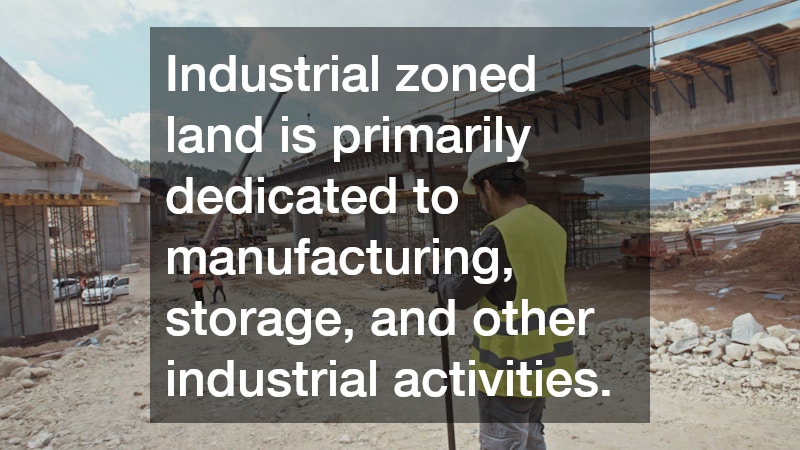
Zoning laws are crucial in urban planning as they designate the purpose for which land can be used in different areas. These laws have been established to divide urban spaces into different zones such as residential, commercial, agricultural, and industrial zones. Knowing these distinctions is vital for potential property builders and buyers as it helps in adhering to legal requirements and avoiding unnecessary legal conflicts.
Industrial zoned land is primarily dedicated to manufacturing, storage, and other industrial activities. Developing a residential structure in such zones requires careful consideration and usually necessitates permission or changes in zoning codes.
Building houses or other non-industrial structures on this type of land can impact urban development strategies and might conflict with current city plans.
Local governments typically enforce zoning laws to maintain order and ensure compatibility within different zones. Hence, constructing homes on industrial-zoned land might not only be against local regulations but could also be impractical given the noisy, polluted environment typical of industrial areas. Before considering construction, individuals must thoroughly understand these zoning laws and the implications of building on land with such restrictions.
Challenges of Building on Industrial Zoned Land
Building a house on industrial zoned land presents numerous challenges primarily because such lands are designed for industrial use. Industrial zones are often clustered with factories and facilities that emit noise and pollutants, which can make the location unsuitable and even hazardous for residential living. The presence of heavy machinery, high traffic volumes, and a lack of residential amenities further diminishes the desirability of such zones for housing purposes.
Another significant challenge is the potential difficulty in obtaining necessary permits or approvals. Applying for a rezoning permit can be a lengthy process, involving public hearings, community meetings, and legal reviews that can delay construction indefinitely. Moreover, residents might oppose transformations from industrial to residential zones due to foreseeable impacts on local economies or disturbances in current urban planning strategies.
Financial institutions might also be reluctant to approve mortgages or loans for such constructions. The risk associated with residential developments in industrial zones often deters banks due to predicted depreciation of property value under strained environmental conditions. Consequently, potential homeowners looking to build on industrial-zoned land might face increased challenges in acquiring funding, further complicating their plans.
The Process of Rezoning
Rezoning is a crucial step if you intend to build a house on industrial zoned land. Typically, this involves a formal application to the local zoning board to change the designated use of the land from industrial to residential. This request is followed by a series of reviews and consultations to ensure the proposed change aligns with municipal plans and regulations.
During this process, stakeholders, including local residents, business owners, and environmental experts, may express concerns or provide inputs. Public hearings are often held to gather community feedback, which plays a pivotal role in the decision-making process. This step is designed to ensure transparency and gather a comprehensive understanding of how rezoning might impact the area.
In some cases, rezoning may not be feasible due to pre-established long-term municipal plans. If approved, however, rezoning comes with commitments to adapt infrastructure and comply with residential building codes. Thus, individuals or developers must be prepared to commit substantial time and resources to navigate the complex rezoning process successfully.
Benefits and Drawbacks of Building on Industrial Zoned Land
One potential benefit of building on industrial zoned land is the lower cost of acquisition compared to residential zones, due to the land’s original intended use. For developers, the potential for future rezoning could mean increased land value and profit. Moreover, early development in such areas could lead to a pioneering effect, setting the stage for new residential communities and possible re-evaluation of adjacent lands.
Despite these potential benefits, the drawbacks remain significant. Infrastructure in industrial zones is typically not designed to support residential needs, lacking schools, parks, and other community facilities. Residents might face various environmental hazards, such as air and noise pollution from nearby industrial activities, contributing to a lower quality of life.
The uncertainty involved in rezoning processes and community opposition can result in significant delays and increased costs. There is also the prospect of living amidst ongoing industrial activity, which might not be an ideal or healthy living environment. These challenges illustrate why thorough evaluation and strategic planning are critical when considering housing development on industrial zoned land.
In conclusion, building a house on industrial zoned land is fraught with legal and practical challenges but not entirely impossible. Prospective builders must diligently research zoning laws, environmental conditions, and community perspectives to navigate this complex landscape successfully. Understanding the rezoning process and potential challenges is essential for evaluating the feasibility of such a venture.
While building on industrial zoned land can present some advantages, including lower land costs and future development potential, the obstacles are substantial. Environmental factors and infrastructure limitations are critical considerations that can significantly affect living conditions and property value. Consequently, anyone pursuing residential construction on industrial lands should proceed carefully, equipped with knowledge and strategic vision.
Before embarking on such a bold venture, it is advisable to consult with zoning experts, real estate professionals, and legal advisors. Meticulous planning and adherence to local regulations can help mitigate the inherent risks. Ultimately, the decision must rest upon a balanced understanding of both the opportunities and the hurdles that industrial zoned land development presents.



